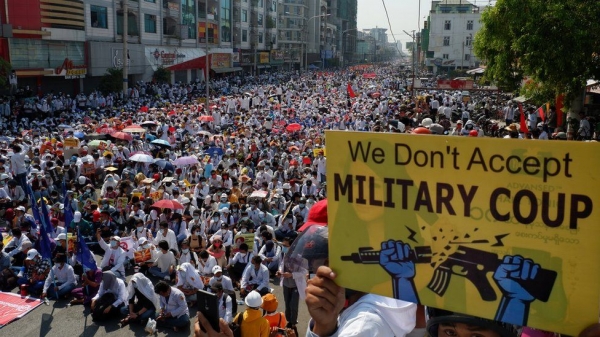
Protests for democracy in Burma (more formally known as Myanmar) have erupted after the military staged a coup against democratically held elections. The Southeast Asian country is under turmoil as the military continues to kill hundreds of civilian protesters, jailing and injuring thousands more.
The military (known as the Tatmadaw) dominates political and economic power in Myanmar. The country was under direct military rule from 1962 to 2011. Since then, the military implemented parliamentary elections and other political and economic reforms in 2011. However, the military still held a significant amount of power by ensuring that a quarter of the seats in the Union Parliament are reserved for the military, and controlling all uniformed personnel independently through the Ministry of Home Affairs. The Myanmar Economic Corporation (MEC) and Myanmar Economic Holdings Limited (MEHL) are the main two key conglomerates that provide wealth for the military.
The military seized control of the country on Feb. 1 because the civilian party, the National League for Democracy (NLD), won 83% of the parliament’s available seats in the general election. The armed forces, which had backed the opposition, claimed there was widespread fraud without presenting any evidence. The national election commission, as well as independent observers such as The Carter Center which had more than 40 observers visiting polling stations on election day, said there was no widespread fraud.
The coup was carried out just before a new session of parliament was set to open following the election. The military detained more than 500 political figures, including the popular elected NLD leader Ms. Aung San Suu Kyi, President U Win Myint, members of the NLD, ministers, writers, and activists among others. Military commander-in-chief Min Aung Hlaing has now taken power. Citing the 2008 Constitution, the military declared a state of national emergency of one year. The military imposed curfews and limited gatherings. Television broadcasts as well as telephone and internet connections were suspended in major cities. The stock market and commercial banks were closed and flights were cancelled.
The military’s response to the protests of Burmese citizens has become increasingly bloody. Soldiers have fired water cannons, rubber bullets, tear gas, and finally live ammunition indiscriminately at protesters and passers-by.
The Burmese people have risen in mass protest at the military coup, the largest since the Saffron Revolution of 2007. Since then, a civil disobedience movement with widespread labor walkouts in places such as government tax offices, the government electricity ministry and private banks is disrupting the junta. The protests are mostly peaceful, but as the military reaction became more violent, some are building makeshift weapons and seeking military training from rebel ethnic militias on the borders. The military has not backed down despite widespread opposition.
The coup will have a big negative impact on Myanmar’s economy. In addition to general strikes, protesters are boycotting companies linked to the military to cut off their money supply. Abroad, the coup has prompted companies to halt or reduce investments linked to the military. For example, the South Korean steelmaking company, POSCO Coated & Color Steel, announced it would end a joint venture with MEHL, while the Japanese beverage firm Kirin ended two lucrative deals with MEHL. The World Bank forecast that Myanmar’s economy would shrink by 10% this year, as the turmoil continues. In October 2020, it had estimated a growth of 5.9%, one of the strongest in the region.
The coup was internationally condemned. “We strongly condemn the escalating violence against protests in Myanmar and call on the military to immediately halt the use of force against peaceful protesters,” said Ravina Shamdasani, a spokeswoman of the U.N. human rights office. The U.S. responded with the European Union by imposing sanctions on military officials. South Korea’s government responded to the coup by stopping joint military and police training courses, banning exports of military supplies, and scrutinizing all development projects except humanitarian projects. South Korea was one of the 10 main traders with Myanmar.
The coup could erase the progress of Myanmar’s brief period of democracy. António Guterres, the United Nations secretary general, said the coup developments “represent a serious blow to democratic reforms in Myanmar.”


